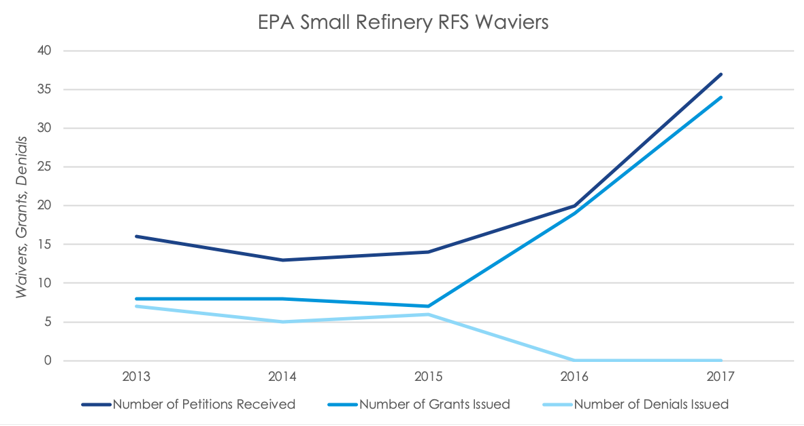|
For the first time since 1998, Americans consumption of ethanol fuel declined. According to the Energy Information Association, a Federal agency, consumption fell from 14.5 billion gallons in 2017 to just under 14.4 billion gallons in 2018. The Renewable Fuel Association (RFA), a policy advocate for the ethanol industry, suggests that a change in the overall blend rate, via a decline in RIN waivers, led to the decline. One of the many responsibilities of the Environmental Protection Agency is to administer waivers that allow small refiners to forego the blending requirements set by the Renewable Fuel Standard (RFS). The RFS is a Federal program that requires transportation fuel sold in the U.S. to contain a minimum level of renewable fuels. The EPA extends waivers to refiners that demonstrate disproportionate economic hardship.
When the EPA administers more exemption waivers to refiners, the average blend rate would be expected to fall. In 2018, that level did fall, from 10.13% to 10.07%, after being as high as 10.75% in January of last year. Data from the EPA shows that both applications and grants for RFS exemption waivers have steadily risen over the last five years for small refineries. Grants increased 78.95% from 2016 to 2017, the last year with full data available on the waivers.
1 Comment
|
Archives
August 2019
Categories
All
|
|
Skyline Advisors is a division of Ideation Ventures, Inc. Services involving securities are offered through M&A Securities Group, Inc.4151 N Mulberry Drive Suite 252, Kansas City, MO, 64116 (“MAS") . Services involving real estate brokerage are offered through Berkshire Hathaway HomeServices Ambassador Real Estate ("BHHS"). Skyline, MAS, and BHHS are separate entities.
COPYRIGHT 2024. ALL RIGHTS RESERVED. |


 RSS Feed
RSS Feed
